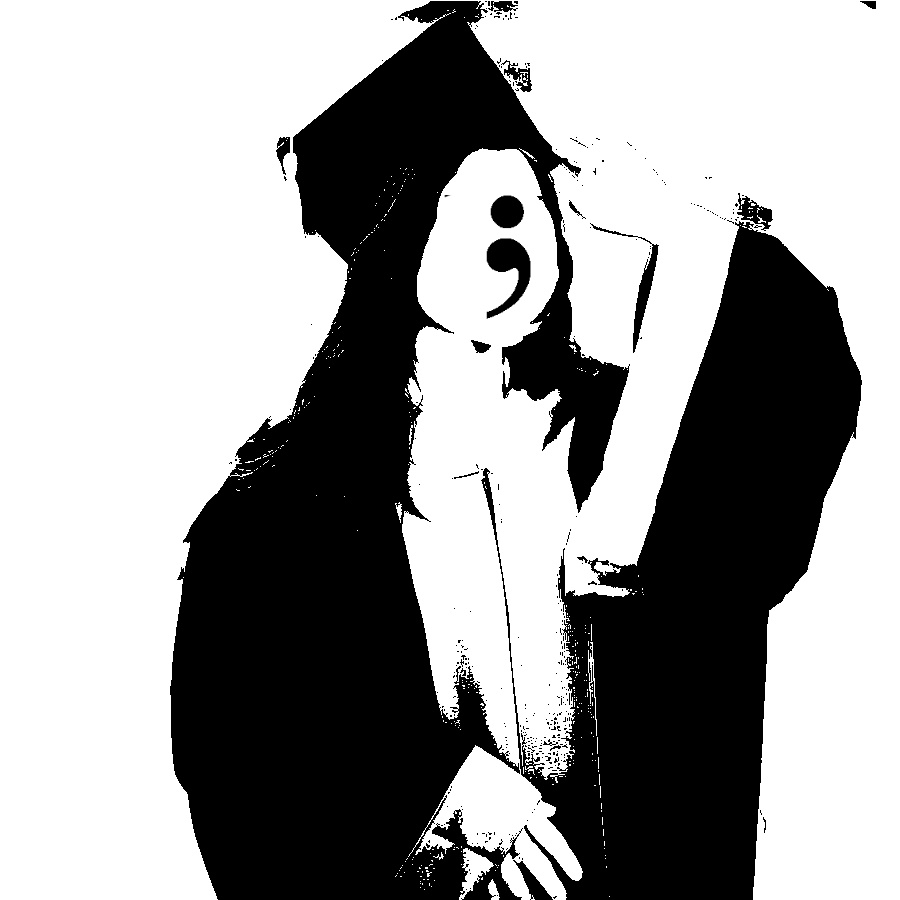As I scrolled through social media, a slide show popped up of a young girl in graduation regalia. Text covered the top of the photo: “Bipolar people are 70% less likely to graduate college.” I swiped to the next photo. The text said: “I will not be a part of that statistic.”
I sat there in the red rolling chair at work, just staring at the text. I remember thinking to myself, That can’t be true.
A quick Google search proved that it was. A webpage for the National Alliance on Mental Illness was the first result to pop up. I clicked the link. My jaw dropped when I read, “[S]tudents diagnosed with bipolar disorder are 70% more likely to drop out of college than students with no psychiatric diagnosis.”
At this point, I had completely abandoned my Canvas to-do list and just sat there.
I was graduating in May. I was bipolar. Just like the girl on TikTok, I was beating a statistic. Something about thinking of myself as a percentage in a statistic like that made me wrinkle my nose in disgust.
I set my phone down and pushed it away from myself, telling myself I would focus on my homework instead.
Emails, Regalia and Jobs
The days pass, and I start getting emails. Emails that directly relate to my graduation application. Long-winded emails giving me congratulations and a long list of things to do on top of the mountain of homework I’m procrastinating.
I text my family asking who wants to come and watch me walk. I fill out the surveys and go about my day. I’m honestly looking for something to occupy my mind besides the upcoming due date of the next section of my capstone paper.
I order cords and a stole for my honor societies. My advisor does an audit on my degree and gives me the all-clear. This is happening. I’m going to graduate.
Even with all the good news and the “congratulations” from my family and friends, it still feels off. And every day I wonder why that statistic exists. It feels like people with bipolar, and other mental illnesses, are set up for failure.
I tell my mom I don’t feel good, and school feels like it’s too much. She tells me that I’m smart, that I’ll find a job, and that everything will be okay. But it doesn’t feel okay.
I should be happy. I’m about to finish something that is almost a pipe dream for mentally ill people evidently. So why does it feel like I’m choking on my own success?
Bipolar Depression and Mania in Academia (and Other Disabilities)
I’m not new to feeling a lack of self-confidence in academics or life, so why does this feel so different? I’m twenty-one years old and practically choking at the thought of receiving my diploma. Even worse is the thought of getting a job. Why is this so hard? And why does it feel like I have nowhere to go?
I know full well that college or academia in general are not designed for people with mental disabilities. Even with ADA and student services, it’s not enough.
I remember when I first applied for an ADA accommodation. I think I submitted three letters from my psychiatrist to them. They were nice, it wasn’t their fault, it’s academia’s fault. Due dates, timed tests and in-person classes are all obstacles that are difficult for anyone. Add in bouts of depression and mania, and you’re fighting against yourself, not just the due date.
It’s honestly a wonder I’m graduating at all, much less in four years.
I think back to the professors I’ve had, especially since getting to upper-level courses. Delta State is nice. I know my professors. I like to think they know me too. They trust me. They listen to me.
I’m hit with the question: would I be graduating at all if it weren’t for my professors working with me?
The second question that hits me is: what happens to bipolar students and disabled people at bigger schools? If they can’t communicate openly and safely with their professors, how are they accommodated at all?
Statistics and Realizing It Isn’t Enough
I don’t understand why this isn’t talked about more. In 2024, there is the ability to make reasonable accommodations for these groups. Why is that not being done more? Is it about stigma? 52% of people admit to not feeling comfortable discussing their mental health with superiors in the workforce. At that point, this is a societal issue, not an academic issue.
Everyone tells me I’m smart, and that I’ll be successful. I’m not sure how true that is but I do know that 52% of people is 52% too much. Suicide is the second-leading cause of death in adolescents and young adults. And still, the pressure to succeed in college is a battlefield of its own.
Not enough is being done for these people’s health or for their success.
Resources
- National Suicide Hotline: Call: 988
- Crisis Text Line: Text: 741741
- SAMHSA (Substance Abuse and Mental Health Services Administration) National Helpline: Text: 435748, Call: 1-800-662-4357
- NAMI (National Alliance on Mental Illness) Helpline: Text: 62640, Call (800)950-6264
- Mental Health Hotline: Call: (866) 903-3787




